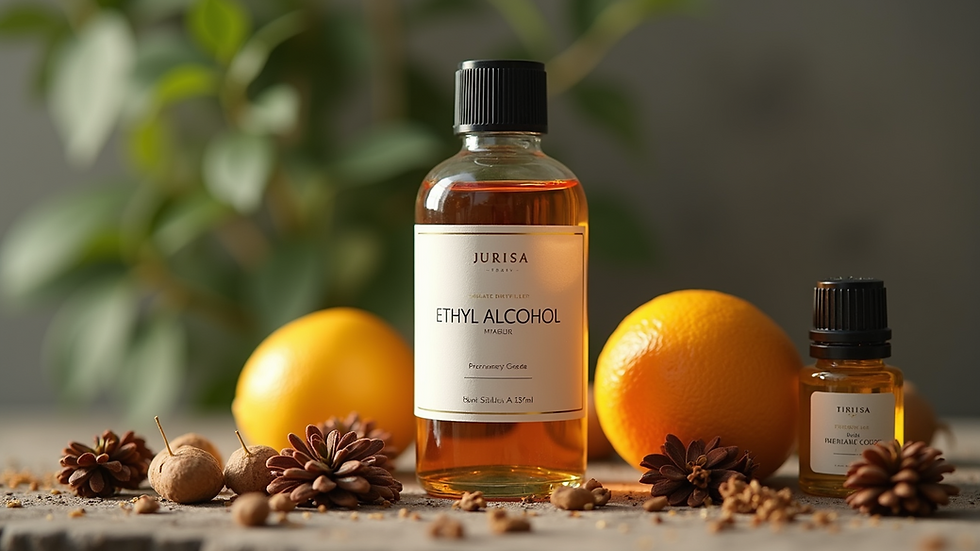Unlock the Secrets of Perfume Making with Top-Quality Perfumery Grade Ethyl Alcohol!
- subalaoffice
- Jul 14, 2025
- 4 min read
Creating your own signature scent is an enchanting journey filled with creativity and inspiration! If you’ve ever dreamed of crafting a perfume that uniquely captures your personality, you’re not alone. In this blog post, we will dive into the world of perfume making, especially focusing on how perfumery grade ethyl alcohol can be your best companion in this aromatic adventure.
Why Choose Perfumery Grade Ethyl Alcohol?
https://www.itawsm.com/product-page/perfumery-ethanol-ethyl-alcohol Purity is essential! When it comes to perfume making, using high-quality ingredients is crucial. Perfumery grade ethyl alcohol, with a purity of 99.9%, stands apart from regular ethanol and other spirits. It provides an excellent medium for mixing scents without compromising their inherent qualities. This alcohol's neutral odor ensures that the delicate notes of your chosen fragrance oils shine through, allowing you to create truly unique blends.
For example, using perfumery grade ethyl alcohol enhances the scent profile of essential oils. When mixed with lavender oil (known for its calming properties) and bergamot (which can uplift moods), the resulting perfume maintains clarity and balance. This allows you to capture the essence of both oils without one overpowering the other.
The versatility of perfumery grade ethyl alcohol allows both newcomers and experienced creators to explore their creativity without fear. If you're just starting your scent crafting journey, you’ll find this alcohol blends effortlessly with various essential oils and aroma compounds, making the process smooth and enjoyable.
The Art of Blending
Creating a perfume involves more than just mixing fragrances; it's an art that requires knowledge and experimentation!
Understanding Fragrance Families
Before diving into mixing, familiarize yourself with the four major fragrance families: floral, oriental, woody, and fresh. Each family has its distinctive characteristics.
Floral: Often associated with romance, filled with notes like rose, jasmine, and lavender. For instance, combining jasmine with a hint of ylang-ylang can produce a sweet and captivating scent.
Oriental: Rich and warm, these scents often include spices, resins, and vanilla. A blend of cinnamon and sandalwood can create a warm, inviting atmosphere.
Woody: Earthy fragrances may feature cedar, sandalwood, or patchouli. For example, a mix of cedar and vetiver can produce a grounded scent perfect for evening wear.
Fresh: Crisp scents often include citrus, green notes, or aquatic elements. Combining lemon and mint creates a refreshing daytime fragrance.
Identifying the fragrance families that resonate with you will help guide your mixing process and inspire memorable combinations. https://www.itawsm.com/product-page/perfumery-ethanol-ethyl-alcohol
The Basics of Crafting Your Signature Scent
With perfumery grade ethyl alcohol, the possibilities are endless! Here’s a step-by-step guide to get you started:
Gather Your Ingredients: Besides the ethyl alcohol, select your essential oils or fragrance oils. Aim for a balance of top, middle, and base notes for a well-rounded perfume.
Mix the Oils: Start by measuring your oils. A common ratio is 30% top notes, 50% middle notes, and 20% base notes. For example, you might use grapefruit (top), jasmine (middle), and vanilla (base) for a balanced blend.
Add Alcohol: Pour the perfumery grade ethyl alcohol into the blend. Use a typical ratio of around 20-30% fragrance oils to 70-80% alcohol.
Allow it to Mature: Let your mixture age for at least 48 hours — the longer, the better! A week or more can enhance your fragrance’s depth and character.
Test the Scent: After aging, test a small amount on your skin. Remember, body chemistry can alter how a scent develops, sometimes leading to pleasant surprises!
Adjust as Needed: Don’t hesitate to modify your blend! Adding a few more drops of a favorite note, like a hint of geranium, can significantly change the scent's character.

Dos and Don'ts of Perfume Making
Creating your unique fragrance is a delightful process, but a few tips can ensure success:
Do:
Keep a Journal: Document your recipes and processes. It helps refine your skills and recreate favorite scents in the future.
Experiment: Have fun with different combinations! Each attempt is a learning opportunity, so feel free to mix and match.
Test in Small Batches: Start small to avoid wasting precious ingredients. You can always scale up once you're satisfied with your creation.
Don't:
Rush the Maturation: Patience is crucial! Hurrying the aging process can yield a less harmonious scent.
Ignore Safety: Always handle alcohol with care. Work in a well-ventilated area and avoid open flames.
Overcomplicate: Sometimes, the simplest blends are the most stunning. Start with a few selected oils before venturing into more complex combinations.
Embarking on Your Scent Journey
The journey of perfume making can be incredibly rewarding! With top-quality perfumery grade ethyl alcohol at your side, you’ll have the freedom to experiment, create, and refine your stunning fragrances.
Whether you're crafting a scent that evokes cherished memories or a fresh blend that captures your adventurous spirit, this ethyl alcohol will be a crucial element in your creative toolbox. As you explore the world of scents, remember that the most important aspect is enjoyment!
So gather your ingredients, unleash your creativity, and unlock the secrets of perfume making with confidence! Your signature scent awaits! https://www.itawsm.com/product-page/perfumery-ethanol-ethyl-alcohol





Comments